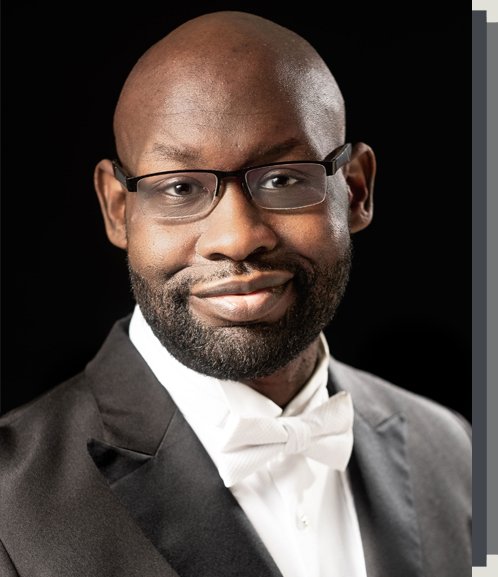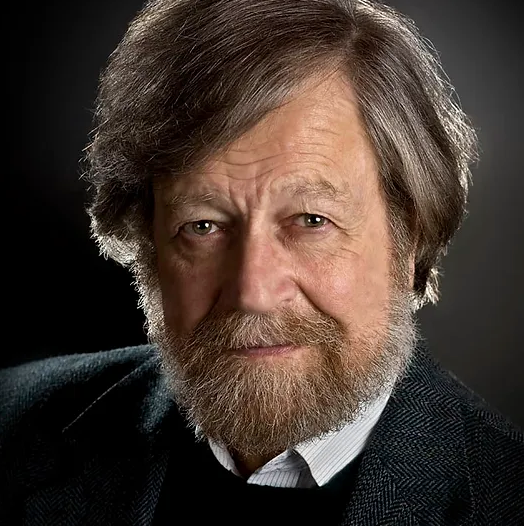Program Notes
Silver Swan by Bob Chilcott
As a composer, conductor, and singer, Bob Chilcott has enjoyed a lifelong association with choral music, first as a chorister and choral scholar in the choir of King’s College, Cambridge, and for 12 years as a member of the King’s Singers. He became a full-time composer in 1997, and has produced a large catalogue of music for all types of choirs which is published by Oxford University Press.
Chilcott’s setting of Orlando Gibbons and Catullus is a re-working of Gibbons's celebrated seventeenth-century madrigal (of the same title) for five voices. It retains the lilting depiction of the swan and the original composer's love of antiphonal effects and rich texture.
The Silver Swan by Orlando Gibbons
The silver swan, who living had no note,
When death approached, unlocked her silent throat;
Leaning her breast against the reedy shore,
Thus sung her first and last, and sung no more:
“Farewell, all joys; Oh death, come close mine eyes;
More geese than swans now live, more fools than wise.”
When Music Sounds by Victor C. Johnson
Victor C. Johnson is an award winning composer and arranger, in addition to being an experienced music educator and conductor. Having his first choral composition published while still a sophomore in high school, composing beautifully crafted choral compositions has been one of his lifelong passions.
When Music Sounds was composed for the 2016 Florida All-State Men's Choir, this expressive and lyrical original work gently flows forward, supported by rich piano textures. With careful attention to part-writing, range and tessitura, this very singable work is ideal for developing sensitivity in your men's chorus and festival concerts.
When Music Sounds, poem by Walter de la Mare
When music sounds, gone is the earth I know, And all her lovely things even lovelier grow;
Her flowers in vision flame, her forest trees Lift burdened branches, stilled with ecstasies.
When music sounds, out of the water rise Naiads whose beauty dims my waking eyes,
Rapt in strange dreams burns each enchanted face, With solemn echoing stirs their dwelling-place.
When music sounds, all that I was I am Ere to this haunt of brooding dust I came;
And from Time's woods break into distant song The swift-winged hours, as I hasten along.
Light of a Clear Blue Morning by Dolly Parton
Dolly Parton helped revolutionized the world of country music for women performers. Then Parton took her crusade a step further by crossing over to the pop world—landing on the cover of Rolling Stone, achieving pop hits, and starring in a series of Hollywood movies.
Dolly Parton estimates that she has written close to 3,000 songs throughout her illustrious seven-decade career including Light of a Clear Blue Morning. As Parton has told interviewers over the years, the song came out of the pain from her break with her longtime musical and business partner at the time. It was written as Parton felt the figurative clouds lifting, as she moved on from a tumultuous time and came fully into her own.
Light of a Clear Blue Morning, lyrics by Dolly Parton
It's been a long dark night
And I've been a waitin' for the morning
It's been a long hard fight
But I see a brand new day a dawning
I've been looking for the sunshine
You know I ain't seen it in so long
But everything's gonna work out just fine
And everything's gonna be all right
That's been all wrong
I can see the light of a clear blue morning
I can see the light of a brand new day
I can see the light of a clear blue morning
Oh, and everything's gonna be all right
It's gonna be okay
Jenny Rebecca
peom and music by Carol Hall
Jenny Rebecca, four days old / How do you like the world so far? / Jenny Rebecca, four days old / What a lucky, lucky, lucky / Lucky girl you are
For you have swings to be swung on / Trees to be climbed up / Days to be young on / Toys you can wind up
Grass to be lying on / Sun up above / Pillows for crying on / When you're in love
Ponies for riding / Wind in your hair / Slides to be sliding on / Leaves in the air
Dogs to be caring for / Love to be giving / Dreams to be daring for / Long as you're living
Jenny Rebecca, four days old / What a lucky, lucky, lucky / Lucky girl you are
maggie and milly and molly and may
poem by E.E. Cummings; music by Eric Whitacre
maggie and milly and molly and may
went down to the beach(to play one day)
and maggie discovered a shell that sang
so sweetly she couldn't remember her troubles,and
milly befriended a stranded star
whose rays five languid fingers were;
and molly was chased by a horrible thing
which raced sideways while blowing bubbles:and
may came home with a smooth round stone
as small as a world and as large as alone.
For whatever we lose(like a you or a me)
it's always ourselves we find in the sea
Only In Sleep
music by Erics Esenvalds; poem by Sara Teasdale
Only in sleep I see their faces
Children I played with when I was a child
Louise comes back with her brown hair braided
Annie with ringlets warm and wild
Only in sleep Time is forgotten—
What may have come to them, who can know?
Yet we played last night as long ago
And the doll-house stood at the turn of the stair
The years had not sharpened their smooth round faces
I met their eyes and found them mild—
Do they, too, dream of me, I wonder
And for them am I too a child?
When You Are Old and Gray
music by Mari Esabel Valverde; poem by William Butler Yeats
When you are old and gray and full of sleep,
And nodding by the fire, take down this book,
And slowly read, and dream of the soft look
Your eyes had once, and of their shadows deep;
How many loved your moments of glad grace,
And loved your beauty with love false [or]1 true,
But one man loved the pilgrim soul in you,
And loved the sorrows of your changing face;
And bending down beside the glowing bars,
Murmur, a little sadly, how love fled
And paced upon the mountains overhead
And hid his face amid a crowd of stars.
Calling My Children Home
by Lawson, Yaller and Yates
Those lives were mine to love and cherish / To guard and guide along life's way
Oh God forbid that one should perish / That one alas should go astray
Back in the years with all together / Around the place we'd romp and play
So lonely now I oft' times wonder / Oh will they come back home some day
I'm lonesome for my precious children / They live so far away
Oh may they hear my calling, calling / and come back home some day
I gave my all for my dear children / Their problems still with love I share,
I'd brave life's storm, defy the tempest / To bring them home from anywhere
I lived my life my love I gave them, / to guide them through this world of strife,
I hope and pray we'll live together / In that great glad here after life
I'm lonesome for my precious children / They live so far away
Oh may they hear my calling, calling / and come back home some day
Lux Aeterna by Morten Lauridsen
The music of Morten Lauridsen occupies a permanent place in the standard vocal repertoire of the Twenty-First Century. His eight vocal cycles, instrumental works, art songs and series of sacred Latin motets
are performed throughout the world and have been recorded on over two hundred CDs, including several that have received Grammy nominations.
Lauridsen composed the requiem Lux Aeterna in 1997, the year his mother died. The five movements of Lux Aeterna are based on various references to light from sacred Latin texts: perpetual light, light risen in the darkness, Redeemer-born light from light, light of the Holy Spirit, light of hearts, most blessed light, eternal light — all supporting an earthbound spirit seeking not only mercy, understanding, and consolation but also renewal.
Movements 1 & 2 - Lux Aeterna and In Te, Domine, Speravi
Lauridsen uses the beginning and ending of the traditional Requiem Mass to open and close Lux Aeterna. The second movement, “In Te, Domine, Speravi” (Lord, I have hoped in you), opens with a chant from the hymn “Herliebster Jesu” (Dearest Jesus) published in a 1677 songbook, addressed to the trusted Lord, to whom is directed the gentle plea for mercy.
Movement 3 - O Nata Lux
The third movement, “O Nata Lux” (Oh light born [from light]) is the centerpiece from which all of the other references to light seem to emanate. The tempo changes are beautifully placed to linger on the interplay of voice parts in the style of Renaissance polyphony, creating a showpiece of a cappella choral singing.
Movement 4 - Veni, Sancte Spiritus
In “Veni, Sancte Spiritus” (Come, Holy Spirit), voices soar to high notes on both the words lucis (light) and fletu (grief). This pairing serves as a bridge that brings together all who share the experience of grief. Unison singing at the phrase O lux beatissima (O most blessed light) encourages our hearts with the humble insight necessary to petition on behalf of those we have lost.
Movement 5 - Agnus Dei
The final movement, “Agnus Dei – Lux Aeterna” (Lamb of God, Eternal Light), begins with a long, whispered prayer on behalf of the dead, swells into full voice on the phrase lux aeterna, and ends with an optimistic Alleluia.





